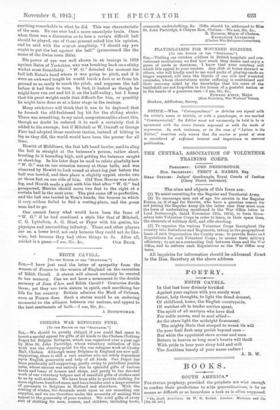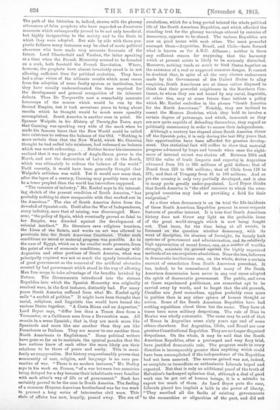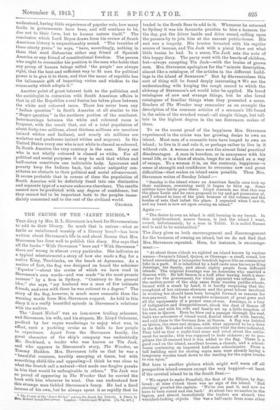BOOKS.
SOUTH AMERICA.* POLITICAL prophecy, provided the prophets are wise enough to confine their predictions to wide generalizations, is by no means so difficult or so hazardous a task as is often supposed.
• The South Americans. By W. H. Koski!. London: Methuen and CO. [10s. Od. not.] The path of the historian is, indeed, strewn with the gloomy utterances of false prophets who have regarded as disastrous measures which subsequently proved to be not only beneficial, but highly invigorating to the society and to the State in which they were adopted. But side by side with these pro- phetic failures many instances may be cited of acute political observers who have made very accurate forecasts of the future. Lord Chesterfield and Vauban, the latter ,speaking at a time when the French Monarchy seemed to be founded on a rock, both foretold the French Revolution. Where, however, the prophets have almost invariably erred is in not allowing sufficient time for political evolution. They have had a clear vision of the ultimate results which must ensue from the adoption of some faulty system or institution, but they have usually underestimated the time required for the development and general recognition of its inherent defects. Thus De Tocqueville cast a remarkably accurate horoscope of the course which would be run by the Second Empire, but it took seventeen years to bring about results which he thought would be much more speedily accomplished. South America is another case in point. Sir Spencer Walpole, in his History of Twenty-five Years, says that Canning was speaking very wide of the mark when he made his famous boast that the New World could be called into existence to redress the balance of the Old. "Nothing is afore certain than that the New World, which Mr. Canning thought he had called into existence, had redressed no balance which was worth redressing. . . . Neither he nor his successors realized that it was the growth of Anglo-Saxon power in the North, and not the destruction of Latin rule in the South, which was ultimately to redress the balance of the world." Until recently, it would have been generally thought that Walpole's criticism was valid. Yet it would now seem that, after the lapse of a century, Canning may possibly turn out to be a truer prophet than the world has heretofore supposed.
"The romance of industry," Mr. Koebel says in his interest- ing sketch of the present condition of South America, " has probably nothing to show comparable with that worked out in the Americas." The rise of South America dates from the downfall of Spanish rule. Until after the War of Independence, every industry, save that of mining, was discouraged. More- over, "the policy of Spain, which eventually proved so fatal to her Empire, was directed against the development of colonial intellect." No literature save religious treatises, the Lives of the Saints, and works on art was allowed to penetrate into the South American Continent. Under such conditions no moral or material progress was possible. As in the case of Egypt, which on a far smaller scale presents, from the point of view of economic conditions, some analogy with Argentina and other portions of South America, what was principally required was not so much the speedy introduction of good government as the removal of the artificial obstacles created by bad government which stood in the way of allowing Man free scope to take advantage of the benefits lavished by Nature. The Governments introduced into the sixteen Republics into which the Spanish Monarchy was originally resolved were, in the first instance, distinctly bad. For many years South America suffered from what Mr. Koebel aptly calls "a surfeit of politics." It might have been thought that racial, religious, and linguistic ties would have bound the various States together. " A Costa Rican and an Argentine," Lord Bryce says, " differ less than a Texan does from a Vermonter, or a Caithness man from a Devonshire man, All remain in a sense Spanish; that is, they are much more like Spaniards and more like one another than they are like Frenchmen or Italians. They are nearer to one another than North Americans to Englishmen." Some political writers have gone so far as to maintain the cynical paradox that the less nations know of each other the more likely are their relations to be those of peace and amity. This is mani- festly an exaggeration. But history unquestionably proves that community of race, religion, and language is no sure pre- ventive of war. " There is no modern instance," Mr. Bodley says in his work on France, " of a war between two countries being delayed for a day because their inhabitants were familiar with each other's way of life or of government." Such has certainly proved to be the case in South America. The feeling of a common Flispano-American brotherhood was fur too weak to prevent a long series of internecine civil wars. This state of affairs has now, happily, passed away. The era of revolutions, which for a long period tainted the whole political life of the South American Republics, and which afforded the standing text for the gloomy warnings uttered by enemies of democracy, appears to be closed. The various Republics are now on good terms with each other. The most powerful amongst them—Argentina. Brazil, and Chile—have formed what is known as the A.B.C. Alliance ; neither is there any sufficient reason for supposing that the harmony which at present exists is likely to be seriously disturbed. Moreover, nothing tends so much to bind States together as the existence of a real or supposed common danger. It cannot be doubted that, in spite of all the very sincere endeavours made by the Government of the United States to allay suspicion, South Americana are at times rather disposed to think that their powerful neighbours in the Northern Con- tinent, to whom they are not bound by any racial, linguistic, or other ties, may at some future time initiate a policy which Mr. Koebel embodies in the phrase "South America for the North Americans." Notably, they are inclined to resent the Monroe Doctrine, which they hold to involve a certain degree of patronage, and which, inasmuch as they are now quite capable of defending themselves, they regard as politically unnecessary in order to secure their independence.
Although a century has elapsed since South America threw off the Spanish yoke, it is only during the last fifty years that fair opportunities have been afforded for genuine develop- ment. One statistical fact will suffice to show that material progress advanced by leaps and bounds when once the night- mare of internal unrest was shaken off. Between 1894 and 1912 the value of trade (imports and exports) in Argentina advanced from 194 to 865 millions of gold dollars; that of Brazil from 218 to 696 millions; that of Chile from 118 to 271; and that of Uruguay from 61 to 108 millions. And as yet the country is only very partially developed, and is also in many parts greatly under-populated. Lord Bryce thinks that South America is " the chief resource to which the over- peopled countries may look as providing a field for their emigration."
At a time when democracy is on its trial the life-incidents of these South American Republics present in some respects features of peculiar interest. It is true that South American history does not throw any light on the probable issue of the great world-struggle which is now being fought out. That issue, for the time being at all events, is focussed on the question whether democracy, with its want of discipline, its absence of foresight, its loosely knit systems of government and administration, and its relatively high appreciation of moral forces, can, as a matter of warlike strength, maintain its ground against the highly organized methods of an unscrupulous absolutism. None the less, believers in democratic institutions can, on the whole, derive a certain amount of consolation from South American precedent. It has, indeed, to he remembered that many of the South American democracies have never in any real sense adopted the spirit of democratic government. The public, and even at times experienced politicians, are somewhat apt to be carried away by words, and to forget that the old proverb, Cueultus non faeit snonaehum, applies probably even more in polities than in any other sphere of human thought or action. Some of the South American Republics have had nothing republican about them but the name. They have at times been mere military despotisms. The rule of Diaz in Mexico was wholly autooratic. The same may be said of that of Roses in Argentina some sixty years ago and of some others elsewhere. But Argentina, Chile, and Brazil are now genuine Constitutional Republics. They are no longer disguised despotisms. On the whole, it may be said that the South American Republics, after a prolonged and very fiery trial, have justified democratic rule. The progress made in every direction is incomparably greater than anything which could have been accomplished if the independence of the Republics had not been asserted. The success gained was not, indeed, so complete or immediate as enthusiastic Liberals hoped and expected. But that is only an additional proof of the truth of Helvetii-Ws hackneyed aphorism that, although a deal of good work can be got out of human beings, it is a mistake to expect too much of them. As Lord Bryce puts the case, Liberals placed too implicit a faith in the power of liberty, "They ascribed all the faults of existing governments to the monarchies or oligarchies of the past, and did not
understand, having little experience of popular rule, how many faults in governments have been, and will continue to be, due not to their form, but to human nature itself." The conclusion which Lord Bryce draws from his review of South American history is unquestionably sound. "The troubles of these ninety years," he says, "have, accordingly, nothing in them that need dishearten either any friend of Spanish America or any friend of constitutional freedom. The person who ought to reconsider his position is the man who holds that any group of human beings called ' the people' are always right, that the best and sufficient way to fit men for political power is to give it to them, and that the name of republic has the talismanic gift of imparting virtue and wisdom to the community which adopts it."
Another point of great interest both to the politician and the sociologist in connexion with South American affairs is that in all the Republics areal fusion has taken place between the white and coloured races. There has never been any " Indian question" in South America at all similar to the "Negro question" in the northern portion of the continent. Intermarriage between the white and coloured races is frequent, with the result that, out of a total population of about forty-two millions, about thirteen millions are mestizos (mixed whites and Indians), and nearly six millions are mulattos and quadroons (mixed whites and negroes). In the United States every one who is not white is classed as coloured. In South America the very contrary is the case. Every one who is not wholly coloured is classed as white. For all political and social purposes it may be said that whites and half-castes constitute one indivisible body. Ignorance and poverty keep the Indians back, but colour antipathy con- stitutes no obstacle to their political and social advancement. It seems probable that in course of time the population of South America will be definitely fused into one distinctive and separate type of a nature unknown elsewhere. The results cannot now be predicted with any degree of confidence, but they cannot fail to be important both to the peoples imme- diately concerned and to the rest of the civilized world.
CROMER.


















































 Previous page
Previous page